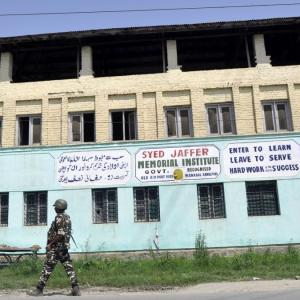Young Kashmiri students are increasingly being drawn into terrorism, with those below the age of 15 now making up more than half of all terrorism-related arrests in the region.
India's Surveillance ToolsPosted by AI on 2025-08-25 13:49:08 | Last Updated by AI on 2025-08-25 16:55:32
Share: Facebook | Twitter | Whatsapp | Linkedin Visits: 0

According to the South Asia Terrorism Portal, Indian officials reported a 170% increase in local Kashmiri youth taking up arms in 2018 compared to the previous year. Of the 354 terrorism-related arrests made in Kashmir in 2018, 183 were minors.
In the first three months of 2019, 28 children were killed in terrorist attacks, according to the UN. Experts are concerned that Kashmiri schools are becoming a breeding ground for radicalisation, with many students exposed to violent and extremist ideologies at an increasingly young age.
A 16-year-old student at a government-run school in Kashmir's capital city, Srinagar, told the BBC: "Students are not only exposed to terrorism in the marketplace, but they are also exposed to terrorism in schools.
"There are some teachers who indirectly preach terrorism in schools. That is one of the reasons why the young generation is getting involved in terrorism."
This worrying trend appears to be spreading to an ever-younger age group. Over the past two years, three students from a leading private school in Srinagar all of whom were below the age of 15 went missing. Two of them are still unaccounted for, while the third boy, now 16, was later arrested by police for allegedly being involved in terrorism-related activities.
In response to the situation, the director of school education, Muhammad Younis Malik, stated that the department would launch counselling sessions for students across the region's schools.
"We want to reach out to each and every student to listen to them and also to make them listen to the advice of experts, so that they themselves come out with complaints or anything they might be facing or feeling," said Malik.
Some locals believe that the root cause of radicalisation in Kashmir stems from a sense of political alienation from the central government in New Delhi. As tensions remain high between the nuclear-armed neighbours, India and Pakistan, Kashmir remains a contentious issue between the two nations.
"The situation has become worse since 2016 [when Indian troops killed the leader of a Kashmiri militant group]. Since then, youngsters have been openly picking up arms as they are completely frustrated," a teacher at a government-run school in Srinagar told the Guardian.
"They feel they have no future, no hope, no jobs, so why not pick up a gun?"
Search
Categories
- Sports
- Business
- History
- Politics
- International
- Science & Technology
- Social Issues
- Disaster Management
- Current Affairs
- Education
- Startup Business
- Startup News
- Awards
- Community Services
- Fundraising Events
- Volunteer Services
- Health Initiatives
- Innovations and Initiatives
- In News
- Banners
- Awards
- Partners
- Products
- Press Releases
- News
- Fast Check
- South
- సినిమా
- Gallery
- Sunday Chronicle
- Hyderabad Chronicle
- లైఫ్ స్టైల్
- National
- క్రైం
- ట్రెండింగ్
- జాబ్స్
- అంతర్జాతీయo
- బిజినెస్
- రాజకీయం
- బిజినెస్
- సంపాదకీయం
- నవ్య
- చిత్ర జ్యోతి
- క్రీడలు
- జాతీయం
- తెలంగాణ
- తాజా వార్తలు
- మన పార్టీ
- మన నాయకత్వం
- మన విజయాలు
- డౌన్లోడ్స్
- మీడియా వనరులు
- కార్యకర్తలు
- North East Skill Center News
- Government Schemes
- Entrepreneurship Support
- Employment Opportunities
- Skill Training Programs
- Departments
- Investments
- Initiatives
- Resources
- Telangana IT Parks
- Events & Jobs
- Press Releases
- News
- Airport News
- Newtons Laws of Motion
- Karbonn in Business
- Investments in Karbonn
- Company quarterly sales
- Markets
- Auto News
- Industry
- Money
- Advertisements
- Stock target
- Company Updates
- Stock Market
- Company Sales
- Staffing and HR
- Constituency Assembly
- General News
- Srikalahasti Temple
- Bojjala Sudhir Reddy
- Technology & Innovation
- Sports
- Business
- Products
- Industries
- Services & Trainings
- Tools & Resources
- Technology Integration
- Drug Seizures & Arrests
- Telangana Narcotics
- Law & Enforcement
- Rehabilitation
- Nationwide Drug Policing
- Nigeria Seizures
- Global Operations
- Drug Awareness
- Drug Enforcement Tech
- NCB Drug Seizures
- Judicial Crackdown
- India's Surveillance Tools
- Cross-Border Links
- Women Safety
- Cyber Crimes
- Drug Abuse
- Traffic & Road Safety
- Community Connect
- Public Safety Alerts
- Citizen Assistance
- Nellore City News
- Politics & Administration
- Events & Festivals
- Agriculture & Rural
- Business & Economy
- Health & Wellness
Recent News
- Case papers destroyed in fire: Court allows NCB to present copies of original documents
- Supreme Court Forces Indian Government to Stop Clinical Trials of 162 Drugs
- Problem With Drug Seizures Spurs Calcutta High Court to Allow Charge Sheets Without Chem Reports
- Nagpur Crime Branch Crushes Drug Ring, Seizes 1kg Ganja
- Smuggling syndicate involves senior army officers: MACC
- Punjab's Narcotic Problem
- # Eyes in the Sky: Drastic Increase in Drone Activity near LoC
- The Made-In-India Abuse Epidemic Devastating Europe